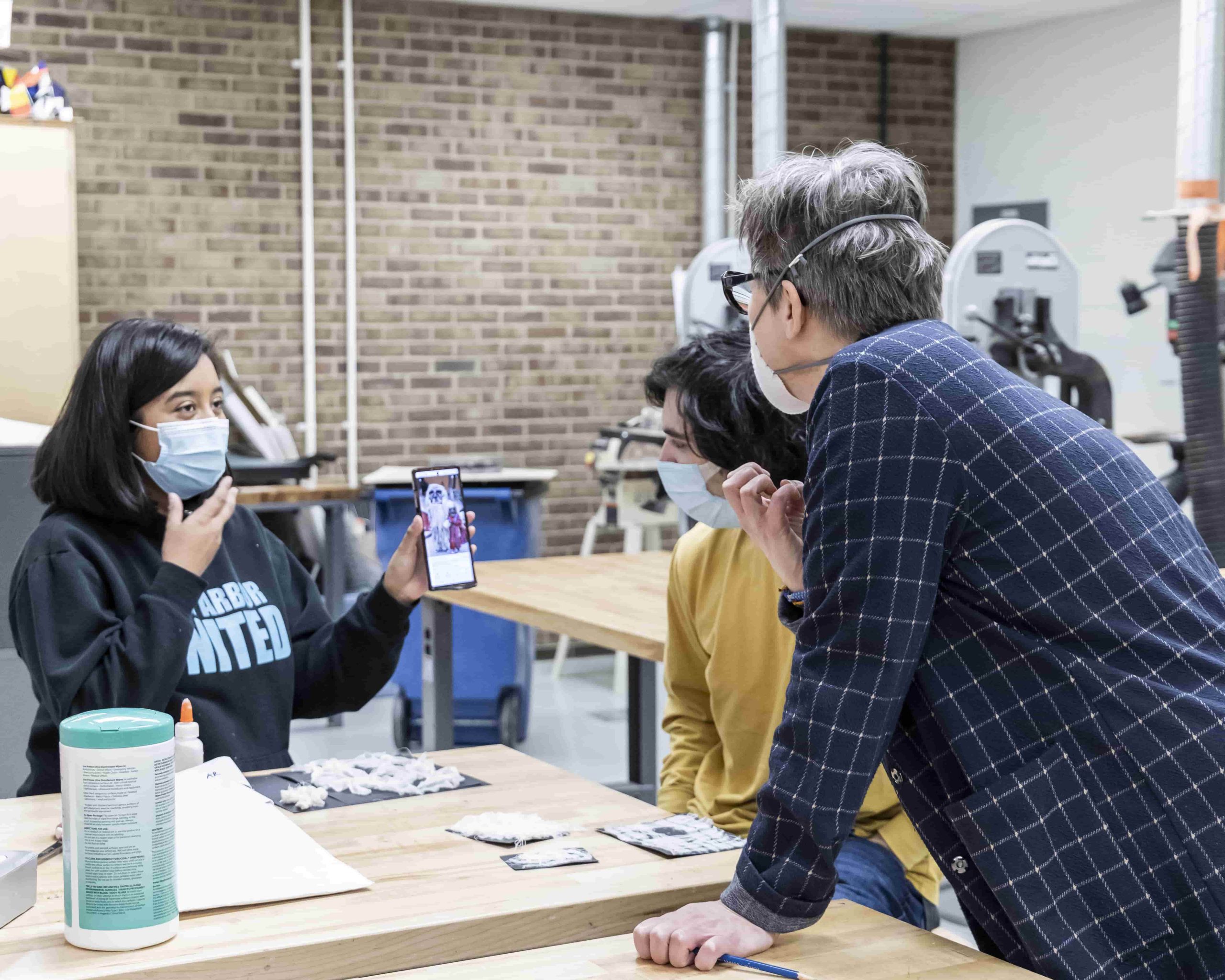
Students talk with art professor Jill Jepsen (right) in ART 112. In winter 2021, most art classes were held virtually due to the COVID-19 pandemic. Now, many of the art classes have returned to campus, and some offer in-person and virtual sections. Shelby Beaty | Washtenaw Voice
by RUBY GO
Staff Writer
In-person classes are making a comeback in the upcoming spring and fall semesters, but it is unlikely that life on campus will ever go back to how it was before the pandemic, said Kimberly Hurns, vice president of instruction.
“I don’t think it will ever be the same,” Hurns said.
Pre-pandemic, virtual learning was nonexistent at WCC; classes were either taken completely asynchronously (online) or in-person. When the pandemic hit, in-person classes shifted to virtual formats which, at the time, were predicted to only last for a few weeks until COVID-19 cases declined. More than two years later, virtual classes are here to stay, Hurns said.
“We’ve done a really good job of meeting students’ needs with our virtual classes, especially those who work 40 plus hours a week,” Hurns said. “But when fall comes around, we’re still not sure what (students) are going to be looking for.”
There is currently no targeted or designated percentage of in-person classes being offered compared to previous semesters, Hurns said. The goal is to have more on-campus classes than virtual classes, but those numbers have been changing frequently as students register. Student demand will determine the types of classes offered.
“The schedule is very dynamic,” Hurns said.
After the pandemic eliminated all but 15% of in-person classes in fall 2020, improved conditions, including the availability of COVID vaccines, allowed an increase to about 38% in-person in fall 2021. This semester, nearly 5,000 students are taking an in-person class, according to WCC officials.
Since the start of the pandemic, about 70% of all full-time faculty, advisers, counselors, librarians and lab technicians have returned to working on campus, said Julie Kissel, president of the WCC faculty union.
“Some of it is personal choice. For me, I’m much happier coming to campus to separate my work life from my home life,” Kissel said. “But it also depends on the classes we teach and student demand.”
Preference for in-person or virtual classes seems to somewhat depend on the subject being taught, Hurns said. For example, students may prefer in-person math classes to online or virtual ones if math is something they struggle with. Conversely, if a student usually excels at math, he or she might opt for an online or virtual class because there is more flexibility and less interaction with a teacher.
“I think it will be a big learning experience for us to see what students go for now that there are all three options,” Hurns said.
While the subject may be an important factor in determining whether to choose in-person or virtual classes, many students say they still prefer in-person classes, overall.
“(In virtual classes) it’s harder to ask questions and actually interact with other people,” said Zeinab Agbaria, an 11th grade student at Washtenaw Technical Middle College, the high school at WCC. “Some people just won’t speak at all and most keep their cameras off.”
Agbaria, a nursing major, prefers in-person classes because they allow her to build better relationships with her peers and teachers. Although she hasn’t taken any nursing classes yet (she recently switched majors), the in-person classes that she has taken have, overall, been more fruitful than her experiences in virtual classes, she said.
Emma Pearson, a general math and science major, also prefers in-person classes. This semester, she is taking all of her classes on campus. She came to WCC last year and has done her best to avoid taking virtual classes.
“I don’t do very good with virtual classes,” Pearson said. “I don’t have the self-control to keep myself on track.”
Pearson chooses not to work because she lives with her parents, but she says that, even if she did work, she would still look for in-person classes that fit her schedule.
“I get that some people with busy lives and jobs might do really well with (virtual) classes because of their flexibility, but the thing is, I need structure,” she said.
On the flip side, in-person classes may trigger anxiety for some students, causing them to prefer virtual or online classes.
“I’m a computer student, so I could do most of my stuff from home anyway,” said Phillip Ignatoski, a computer systems and networking major. “I really only like to interact with people when I have to.”
Ignatoski is autistic, and he says in-person classes are harder for him because of his social anxiety. Being surrounded by other students makes him susceptible to comparing himself to them, and he worries that he is not as skilled or knowledgeable as they are. However, if a class requires more hands-on activities, he prefers to take the class in-person, despite his social anxiety. He works part-time at Office Depot where he repairs computers, and he says the subject of the class—not his job—is what determines if he will take it in-person or virtually.
When in a virtual class, he prefers to leave his camera off, which helps to soothe his social anxiety.
“When you’re in a Zoom class, you don’t really know the other people because you don’t see or interact with them as often,” he said. “That’s the difference between virtual and in-person.”
Michael Quail, a WCC mathematics professor, has been teaching remotely since the start of the pandemic. This semester, he is teaching all online classes and one virtual class, and the same is currently true for the fall semester. He is choosing to remain virtual mainly because of coronavirus concerns.
“I love being in the classroom, and I miss it terribly,” Quail said. “When I’m confident that COVID is truly gone, I will be back in the classroom.”
At the end of the day, both Kissel and Hurns say they have students’ best interests in mind, and they applaud the WCC community’s ability to adapt accordingly.
“Our goal is to do what makes the most sense to meet the student needs and keep everyone safe,” Kissel said.

